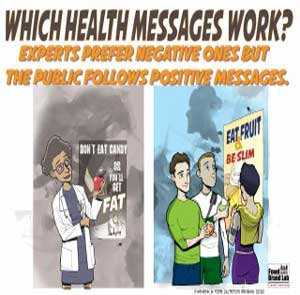Published in the journal Nutrition Reviews, the paper finds that the type of health messaging that is most effective might vary depending on certain characteristics of the target audience.
“Those who are highly involved in the field that a message relates to are more influenced by negative loss-framed messages,” said co-author Lizzy Pope, associate professor and director of the Didactic Program in Dietetics at the University of Vermont. “For example, a medical doctor would be more influenced by, ‘if you don’t use sunscreen you are more likely to get skin cancer’ because they have the knowledge base to process the message and feel a duty to maintain a healthy lifestyle.”
Alternately the research shows positive-framed messages are more effective for members of the general public who have less knowledge about the subject, feel that healthy behaviors are a choice rather than a duty, and have less first-hand knowledge of the consequences of their actions. These people are more likely to look at the big picture and respond to messages that are framed more positively and focus on what is gained by a certain behavior such as, “wearing sunscreen can help your skin stay healthy and youthful.”
“Evoking fear may seem like a good way to get your message across but this study shows that, in fact, the opposite is true – telling the public that a behavior will help them be healthier and happier is actually more effective,” said the paper’s lead author Brian Wansink, director of the Cornell Food and Brand Lab and author of Slim by Design.

















Related Items
Mobile clinics boost health outcomes, cut costs in developing countries
People eat less meat to benefit their own health, not for environment
Himalayan clouds carrying toxic metals pose health risks